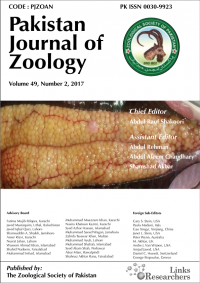MRSA Clinical Isolates Harboring mecC Gene Imply Zoonotic Transmission to Humans and Colonization by Biofilm Formation
MRSA Clinical Isolates Harboring mecC Gene Imply Zoonotic Transmission to Humans and Colonization by Biofilm Formation
Salman Hussain1, Basit Zeshan2*, Rabiya Arshad1, Saba Kabir1 and Naveed Ahmed3
ABSTRACT
This study was conducted for the molecular detection of the mecA, mecC, and nuc gene among MRSA and to investigate biofilm formation among the methicillin-resistant Staphylococcus aureus (MRSA) clinical isolates. A total of 208 different samples were collected and processed for phenotypic and genotypic identification of MRSA. All MRSA isolates were subjected to antibiotics sensitivity, cefoxitin disk diffusion test, and vancomycin minimum inhibitory concentration (MIC) E-test. The MRSA isolates were detected for the presence of mecA, mecC, and nuc genes. Congo red agar (CRA) method was used to assess the ability of isolates to form biofilms. The results of the study showed that the prevalence of MRSA was 48%. The MRSA isolates were highly resistant (100%) to penicillin, β lactamase inhibitors, cephalosporins, and macrolides. All the MRSA isolates were susceptible to vancomycin antibiotic drugs. Cefoxitin (30 µg) disk diffusion test showed 100% sensitivity and specificity for the identification of MRSA phenotypically. A total of 100 MRSA clinical isolates were positive for the mecA and nuc gene. Only 3 MRSA isolates were positive for the mecC gene. Congo red agar method showed that 20 (20%) isolates formed moderate biofilm while 80 (80%) isolates were non-biofilm forming. Multi drugs resistant and mecC gene-positive MRSA isolates are rapidly emerging in Pakistan. Therefore, the mecC gene should be detected along with the mecA gene for the identification of MRSA clinical isolates. It also requires early identification of biofilm formation and necessary interventions for its effective treatment and control.
To share on other social networks, click on any share button. What are these?









